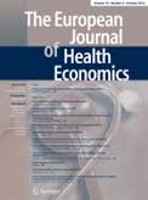Posted by Michael Wonder on 16 May 2018
Patient empowerment in Europe: is no further research needed?

15 May 2018 - In economic theory, health care can be considered a clear example of ‘market failure’ caused by lack of price competition, which does not enjoy the basic conditions to work on both the demand and supply sides; this justifies health economics as a discipline.
From the demand side, patients have hardly ever been considered common consumers in European health-care systems and thus expenses have been mostly funded by ‘third-party payers’ at the macro level. Therefore, physicians respond to ‘payers’ for health-care expenditure at the micro level and are supposed to establish a ‘principal–agent relationship’ with patients, deciding therapies on their behalf to fill the ‘information asymmetry’ gap.
The relationship between physicians and patients has been examined in other disciplines (e.g., philosophy, psychology and sociology), besides health economics. Trying to capture this multidisciplinary approach in the literature, we identified patient empowerment as possibly the oldest and still relevant concept used to describe a physician–patient relationship potentially alternative to that of health economics.

